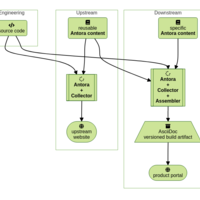Creating a content pipeline with Antora
Using AsciiDoc content for the website and other downstream processes
- Track: Collaboration and Content Management devroom
- Room: D.collab (online)
- Location: Online
- Day: Sunday
- Start: 11:00
- End: 11:45
- Video only: dcollab
- Chat: Join the conversation!

For a project of a reasonable size, there's usually more than one source for the website that needs to be published. For several years, Antora is known as a site generator which pulls AsciiDoc content from multiple Git repositories at once. It publishes a static website where users find a navigation, online search and linked pages, with the option to group everything by component versions.
In 2022, Antora made the leap to open its publishing process to plugins: They allow pulling information dynamically during the build process and forward the content not only to a static HTML site, but other targets like PDF as well. This talk outlines what is possible today with these extensions, and how it can be extended for custom needs.
Several open-source software projects like Fedora, Eclipse Che, Camel, Debezium and Couchbase use Antora. For developers it is normal to develop software in collaboration using their IDE and a version control system like Git. The same type of collaboration is possible when all documentation is versioned in a markup-format like AsciiDoc.
Several examples will be from the Eclipse Che project which leveraged the Antora extensions in 2022. Additional examples show how to enrich the content with metadata and to use the information when building the site, and how to get feedback from the users of the site.
Speakers
| Alexander Schwartz | |
| Fabrice Flore-Thebault |